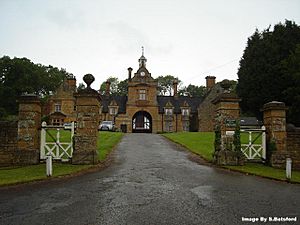Richard Freeman (Irish judge) facts for kids
Richard Freeman (1646–1710) was an English judge. He held a very important job called the Lord Chancellor of Ireland. This role was like being the chief legal advisor and head of the courts in Ireland.
Early Life and Family
Richard Freeman was born in Gloucestershire, England, in 1646. He was the oldest son of John Freeman and Anne Croft. He went to Christ Church, Oxford for his education. In 1674, he became a barrister, which means he was qualified to argue cases in court.
In 1693, Richard Freeman married Elizabeth Keck. She was one of the many daughters of Sir Anthony Keck, a well-known politician and lawyer. Elizabeth died in 1699 while giving birth to their only daughter, Mary.
Richard married again in 1702 to Anne Marshal from Durham. Anne lived many years after him. His first marriage was helpful because his father-in-law, Sir Anthony Keck, was very wealthy. Richard Freeman already owned a large property called Batsford in Gloucestershire by 1693.
Richard Freeman had one daughter, Mary, from his first marriage. Mary married Walter Edwards and had children. From his second marriage, he had a son, Richard junior, and another daughter, Anne. All three of his children were alive in 1727. After Richard Freeman's death, there was a long legal fight over his money and property. This fight lasted until 1727. Mary died in 1736, and Anne died unmarried some years before that. Richard junior died in 1741 without having children.
What Was Richard Freeman's Job?
After working as a lawyer in England for 30 years, Richard Freeman finally got a job as a judge. This happened because of his friendship with John Somers, who was a former Lord Chancellor. Somers thought highly of Freeman's skills.
In 1706, Richard Freeman became the Lord Chief Baron of the Irish Exchequer. This was a senior judge position in Ireland. Within a year, he was made the Lord Chancellor of Ireland. In this role, he was also the Speaker of the Irish House of Lords, which was like leading the upper house of the Irish Parliament. He was also listed as one of the people in charge of the King's Inns in 1706, which is a place where lawyers are trained.
Later Life and Legacy
In 1710, Richard Freeman suddenly became very ill. People said he had "a disorder of the brain" and could no longer think clearly. He had to leave his important job. He died on November 20, 1710, soon after stepping down as Lord Chancellor.
Richard Freeman died without leaving a will. This led to a big disagreement over his property and money among his wife and children. This legal battle went on until 1727.
People generally respected Richard Freeman in Ireland. He was known as a very good lawyer. He was also remembered for being good-humored and kind. His death, especially after his mental health declined, was truly a sad event for many. One writer at the time praised his short time as Lord Chancellor, calling it a "golden age."
 | Delilah Pierce |
 | Gordon Parks |
 | Augusta Savage |
 | Charles Ethan Porter |


